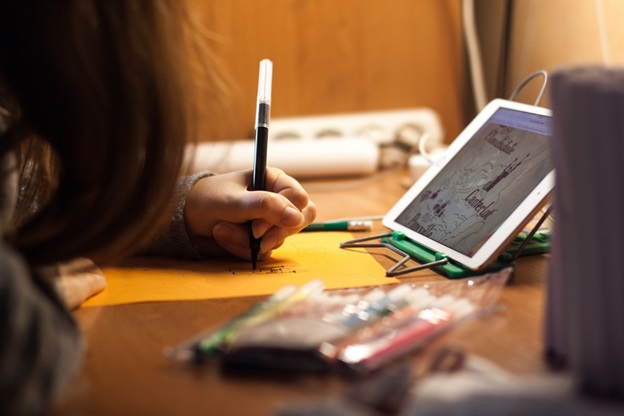In these times when kids are growing up in a digital world, it is essential to help them learn healthy concepts of digital use and citizenship. Parents play a vital role in teaching these skills.
Table of Contents
Educating on the Internet is just as important as educating at home and at school
The Internet is so ubiquitous that it has become one of the many environments in which we coexist with other people. Teaching young people to be civic and responsible on the Internet is just as important as teaching them to look both ways before crossing the street or respecting their peers’ physical and emotional integrity.
If we want to teach children to use technology responsibly, work must begin at home and at school at the same time. Students form their personality on the Internet and perceive the world through screens. That is why the joint effort between teachers and parents is essential. Only in this way will young people become full adults who respect their peers and, furthermore, have acquired the digital skills that will help them prosper in our society.
Technology is a means, not an end
Teaching children to use technology responsibly begins with giving technology the value it has and deserves, neither more nor less. We live in a consumer world where brands are used as a distinctive element, and possessions determine what someone is worth as a person.
As a consequence, it is essential that a child or adolescent understand precisely what mobile or tablet is, what it is worth and what it is used for. Suppose students believe that having the latest technological model will make them better people or that not being in a certain social network takes away their personality. In that case, they will end up developing a toxic relationship with digital elements.
Screens are already everywhere. How do we prevent children from isolating themselves or being distracted?
The omnipresence of digital elements is indisputable. Some educators are already talking about the phenomenon of “ babysitting screens,” which consists of giving tablets and smartphones to babies from birth to entertain themselves and give their parents a break. Furthermore, the role of science fiction helps in shaping a kid’s perception of technology. For example, as seen on coolthingschicago.com, sci-fi books help your kids to improve their reading, vocabulary, and learning skills.
In the same way, teachers complain that students do not pay attention in their classes or that, if they do pay attention, as soon as they walk through the door, the first thing they do is look at their notifications and social networks. So how can we use technology responsibly around minors?
-
There is a time for everything
Before the Internet, children were also distracted and not paying attention. All of us as children have preferred to play in the street or do a puzzle before studying or doing homework. But the adults around us taught us that everything has its time. We knew that homework came first, and then games. We knew that we couldn’t keep our toys on the table or that there was an hour to go to sleep during the week.
The same can be applied to the use of technology. It may seem like an impossible task, but setting usage limits, hours, and rewards will help children see the internet and video games as just another part of their lives, not as a complete environment in which to live.

-
Using technology together and setting an example are very powerful weapons
Parents and a few other close adults are always the biggest influence in anyone’s life. Our parents transmit values, habits, and skills to us and teach us to differentiate what is right from what is wrong. At the point of educating about using technology responsibly, exactly the same thing happens.
Parents and teachers must use technology responsibly in front of and together with children. Leaving the mobile phone while we eat or turning off the tablets if we are watching a family movie are just some examples of behaviors that we can “pass on” to new generations.
Additionally, using screens side-by-side can help us detect harmful behavior or material inappropriate for minors. We have to teach them to avoid certain places on the Internet and to report incorrect behavior they observe.
-
The “netiquette.”
Behaving in a civic and responsible way on the Internet as we do in real life is what we call “netiquette.” And again it is in our hands to teach it to young people as soon as possible. It often happens that the screen acts as a shield, and we can feel that our actions have no consequences. But they always do, and sometimes very serious.
If we want to encourage the responsible use of technology by minors, we must start by clearly explaining that there are also laws, crimes, and undesirable behavior on the Internet. Social networks, blogs, websites, and forums are some of the places where cyberbullying occurs the most, although this is not the only threat we can find.
As in real life, when young people use the Internet, they must be educated and empathize with the people on the other side. And just like in real life, minors need to learn self – control tactics , emotional management, and psychological self-defense . If they are attacked or hurt online, they should feel safe telling their parents and knowing that they are going to retaliate in the physical world. Teaching cybersecurity should also be a priority.
Conclusion
These are some of our recommendations to follow when teaching students to use technology responsibly. Have we left any? What do you do to control the use of the screens in your classroom or your home? Tell us about your experience and share it with the rest of the Innova & Education community.

